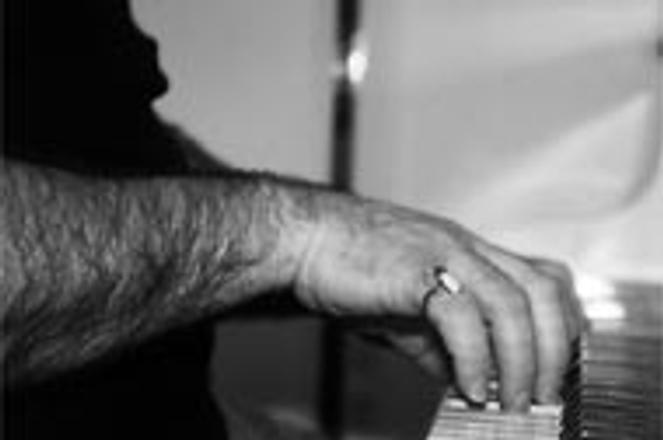Short, chubby fingers roll down the keys of an ivory grand piano. The low notes pound in your chest while the highs flutter about your head like spring butterflies. Softly and steadily, a voice flows forth. It is calming at first, but soon reaches powerful and unimaginable heights. Opera tenor Peter Dvorský belts out an even higher, crisp tone. His fingers stop striking the keys but his voice continues on, filling the silence with a beautiful sound to send warm shivers through anyone.
It is Dvorský's living room in Bratislava, lavishly furnished in an antiqued Viennese style. His grand piano is just one of six. An ornate golden frame is on the opposite wall with a life-size painting of Dvorský himself. As his voice slowly fades out, he turns and says, "I can't sing today."
Slovak opera-goers have missed the opportunity to judge for themselves, since Dvorský resigned from the Slovak National Theater (SND) in October. In spite of this, he is more than content with the performance offers that have poured in from abroad.
"The SND represented the bulk of my work. Many people think that when I quit the theater that I just retired and sat at home. It's not true. I had to leave the theater because I was watching the continuous preparation of a complete change of the artistic system in Slovakia," he said.
Dvorský is passionate about what he feels has happened in culture. "They were trying to quiet the freedom of art so that it can be managed and directed by someone," he said. "An artist is an artist when he can work and freely create, and bring to life something new. Now politics are burrowing into culture. A political party is starting to build new structures, mostly incompetent, within the theater."
Peter Dvorský is saving his voice as he waits for other offers on the entertainment scene in Slovakia and abroad.Ron Severdia
Air, not lemons
But enough of politics - what about the voice? For a world class opera singer the voice is always near, always on the mind. Luciano Pavarotti has been seen chewing lemons and eating ice to keep his voice in tip-top condition. Dvorský in his own words doesn't do anything special, but the topic is close to him.
"For Luciano, ice gets rid of the phlegm and the lemon helps against any inflammation. But if I did it, like he does, I wouldn't be able to sing a single aria. Some of my colleagues can eat or drink beer before a performance, but I absolutely can't. I enjoy breathing fresh sea air to clear my voice. But since I live in central Europe, I have to go to the High Tatras for a while and breathe enough air for the whole year."
OK, so the secret to being an opera star is to breathe fresh air and be overweight. Jerking backwards, Dvorský says emphatically, "Opera singers don't have to be fat. It's a false notion. There are tendencies towards it among tenors. An opera singer has a completely different lifestyle than the average person. And because of our routines, we start to become more... more round. But Pavarotti was once slim and played football. He was a jock."
Dvorský's road to opera stardom was not an easy one. Coming from the small village of Horná Ves, he started studying at the performing arts conservatory in Bratislava at the age of 15, even though it was forbidden to enter the opera program before the age of 18. "At that time it was comical to study singing because singing is so strongly in the roots of Slovak people," he said. "Everybody sings in pubs." Undaunted, he continued his studies. "It was a slap in the face of my family. My father partly agreed with it, but my mother said that I should be a doctor."
Before he had even finished his studies, Dvorský was being offered solo roles at the Slovak National Opera. But he didn't really become known until he guest starred at the Vienna Volksoper's "Faust." "I don't want to sound proud by saying that I worked hard, but I did and luck helped," he related while chomping on Japanese sushi-crackers.
At only 45 years of age, his career has taken him and his wife several times around the world. "I have forbidden my wife to work, so she travels with me and helps. As for my two daughters, one of them is studying scenography at the arts school VŠMU and the second is studying economics. I am glad that they are not following in my footsteps because it is extremely demanding."
Dvorský has been referred to as the "4th tenor" in the wake of the acclaimed "Three tenors" concert (Luciano Pavarotti, Plácido Domingo and José Carreras) in Italy. "I was a viable candidate for this trio, but I wasn't trying for it." he said. "I left it up to the managers. There are other people who are more ambitious who will get such projects. I will leave it for them. Three is a magic number, more wouldn't be any good. 'Kings always have three sons.'"
Pondering on a thought of a return to the Slovak National Opera, he responded, "I quit of my own free will. I had given it a lot of thought and I don't regret it. I will come back, not as a loser but quite the opposite, when everything is clear and corrected and has completely changed. Maybe in one year that will be true."
As far as other performances in Slovakia are concerned, Dvorský is waiting to see what the Slovak entertainment scene will offer him. "I have invitations to go to Prague, to the Opera in Košice, and another big concert in April. There is a new festival called Pod Tatrami, and I will sing at the opening ceremony, but most of what I will do will be on television, like the Miss Slovakia Pageant."

